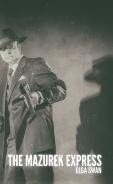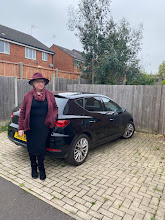 Welcome to the second of my new, international writers', blog series. How fitting that today is 11th May, which is Yom Hazikiron - Israeli Remembrance Day. Here's Israeli author Miriam Drori to tell us more about living in Israel, using and working with a difficult language, and how she's used these influences in her writing.
Welcome to the second of my new, international writers', blog series. How fitting that today is 11th May, which is Yom Hazikiron - Israeli Remembrance Day. Here's Israeli author Miriam Drori to tell us more about living in Israel, using and working with a difficult language, and how she's used these influences in her writing.Advantages of Knowing Hebrew
Aeons ago, just before leaving the UK for my new life in Israel, I revisited my old school and spoke to my old headmistress.
“What are you going to do there?” she asked.
“I’ll start off by attending an ulpan to learn Hebrew,” I replied. Actually, I probably didn’t use the word ulpan.
“Oh,” she said. “I thought you Jews all knew Hebrew.”
No. I did learn some biblical Hebrew when I was much younger. I knew the letters of the alphabet and a few words, but I certainly couldn’t speak or understand modern Hebrew.
I spent six months at ulpan, but all my fellow students there spoke English, so I really only started to become fluent in the language when I began work and had to use it.
Knowing the language has been very important for integrating into Israeli society. Immigrants who don’t learn the language keep with others who know their language and can’t interact with those who don’t. I was lucky, of course, in coming when I was fairly young. Older new immigrants have a lot more difficulty with language acquisition.
Is that the only advantage to knowing Hebrew? No. There have been others. When abroad, we’ve come across tourists speaking Hebrew and got into conversation with them. But the main advantage of Hebrew when abroad is that most people don’t know it.
When we go abroad with a group, we find it a convenient way of discussing things, knowing the guide can’t listen in. There are always such secrets to discuss. The guides also do this. In India and Japan, for example, they can be sure their tourists won’t understand their private conversations. So we can do the same.
In Mexico City, the member of our group chosen to translate added his own opinions. “Monica claims that… but I think…” Monica must have known this was happening. The translations were longer than the original explanations and there was too much laughter when her version contained nothing to laugh about. But there wasn’t much she could do about that.
There are other benefits to speaking more than one language. It apparently keeps dementia at bay. This article says it also improves memory and specifically suggests people who speak another language are better able to put a face to a name. I wish that one worked for me!
And here’s another advantage. You know those strange signs caused by the use of automatic translations, like this one that says, “Correction instead of Fast Service” but should really say, “On-site Repair, Fast Service”? Well, they’re much funnier when you can work out how the errors came about.
***
Miriam Drori is the author of Neither Here Nor There,
a romance set mostly
in her home town of Jerusalem and partly in London, the city in which she was
born and brought up. In the story, Mark, a recent immigrant from London, meets
Esty, who has just left the closed, haredi community in which she was raised.
Both have to get used to a new way of life. Esty, in particular, finds she has
much more to learn than she bargained for.
Neither Here Nor There is available from Amazon,
Smashwords, Barnes
and Noble, Kobo,
iTunes
and elsewhere.Miriam Drori can be found on Facebook, Twitter, Goodreads, Pinterest, Wattpad and on her website/blog.





















No comments:
Post a Comment